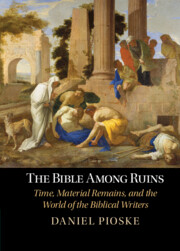Refine search
Actions for selected content:
4 results
5 - Commentary Part III: David’s Rise to Power as King of Judah and Israel – 2 Samuel 1:1–5:3
-
- Book:
- 1 – 2 Samuel
- Published online:
- 14 December 2023
- Print publication:
- 21 December 2023, pp 182-207
-
- Chapter
- Export citation

The Bible Among Ruins
- Time, Material Remains, and the World of the Biblical Writers
-
- Published online:
- 11 October 2023
- Print publication:
- 12 October 2023
168 - Middle Eastern Shakespeare
- from Part XVII - Shakespeare as Cultural Icon
-
-
- Book:
- The Cambridge Guide to the Worlds of Shakespeare
- Published online:
- 17 August 2019
- Print publication:
- 21 January 2016, pp 1249-1254
-
- Chapter
- Export citation
Part XVII - Shakespeare as Cultural Icon
-
-
- Book:
- The Cambridge Guide to the Worlds of Shakespeare
- Published online:
- 17 August 2019
- Print publication:
- 21 January 2016, pp 1183-1260
-
- Chapter
- Export citation
